
- By Theme
-
Destinations
-
Indian Destinations
-
International Destinations
-
- Best Places to Visit
- Packages
- Search Agents
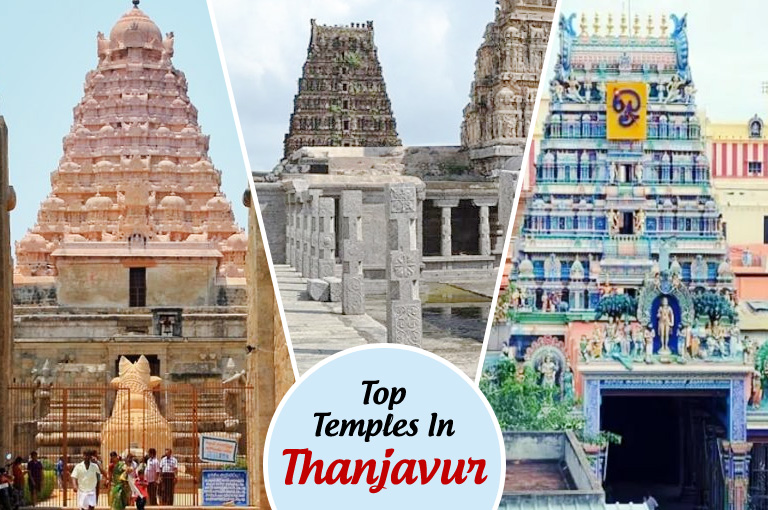
Nestled in the heart of Tamil Nadu, Thanjavur—often called Tanjore—is more than just a city; it is an overflowing treasury of temple architecture, divine devotion, and classical art. Revered for its temples in Thanjavur, it preserves a legacy of Chola temple-building, making it a pilgrimage for art lovers and spiritual seekers alike.
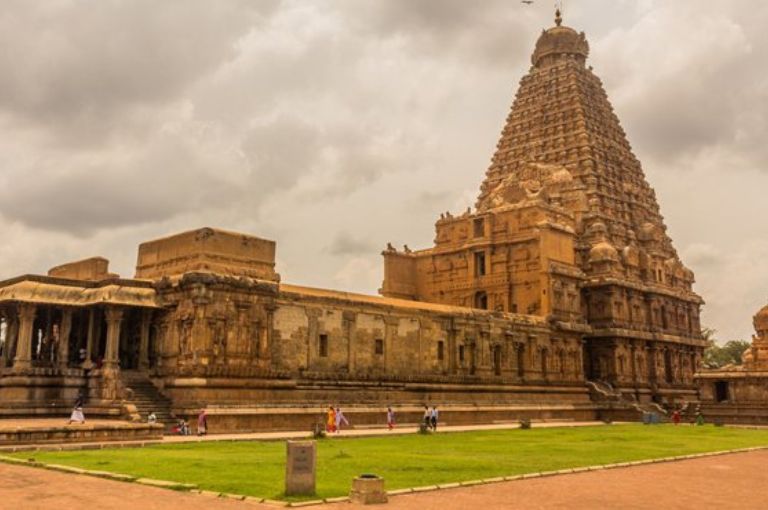
The towering Brihadeeswarar Temple, also known as the Tanjore Big Temple or Tanjore Periya Kovil, stands as Thanjavur’s most iconic shrine. Commissioned by Raja Raja Chola I in the 11th century, this colossal temple honors Lord Shiva and is a UNESCO World Heritage Site. Marvel at its soaring 66-meter Vimana and intricate Chola paintings in Thanjavur—rare depictions of disciples, dancers, and deities. Its historical importance is woven into the Thanjavur temple history in Tamil, found through inscriptions and traditional retellings.
Timings: 6:00 AM – 12:30 PM, 4:00 PM – 8:30 PM
Darshan Time: 1–2 hours
Entry Fee: Free
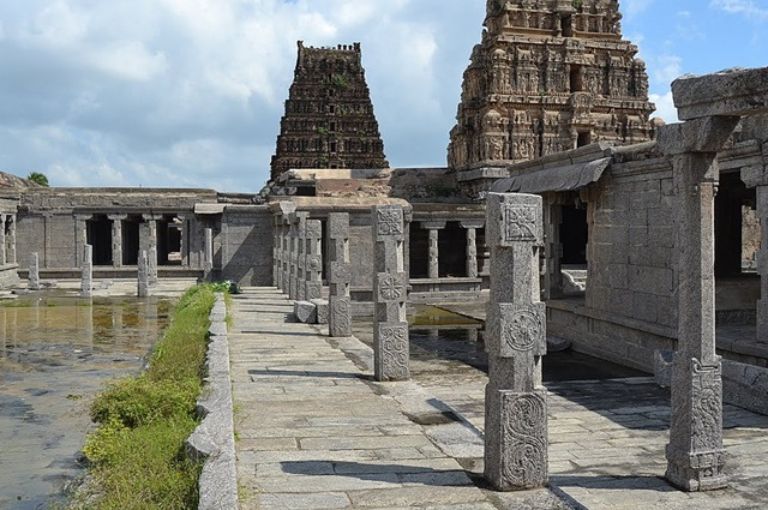
The Mannargudi Temple, dedicated to Lord Rajagopalaswamy (a form of Vishnu), is one of the largest Vaishnavite temples in India. Known as the “Dakshina Dwaraka” (Southern Dwaraka), this magnificent shrine boasts 16 gopurams, a vast temple tank (Haridra Nadhi), and intricately carved stone pillars. The temple is a major pilgrimage site, especially during the Panguni Brahmotsavam festival, which draws thousands of devotees.
Highlights:
Massive temple complex covering 23 acres
Rich Dravidian architecture with exquisite carvings
Sacred temple tank (Haridra Nadhi) spread over 23 acres
Hosts the grand Panguni Brahmotsavam annually
Timings:
Morning: 6:00 AM – 12:00 PM
Evening: 4:00 PM – 9:00 PM
Darshan Time: Around 1–2 hours
Entry Fee: Free
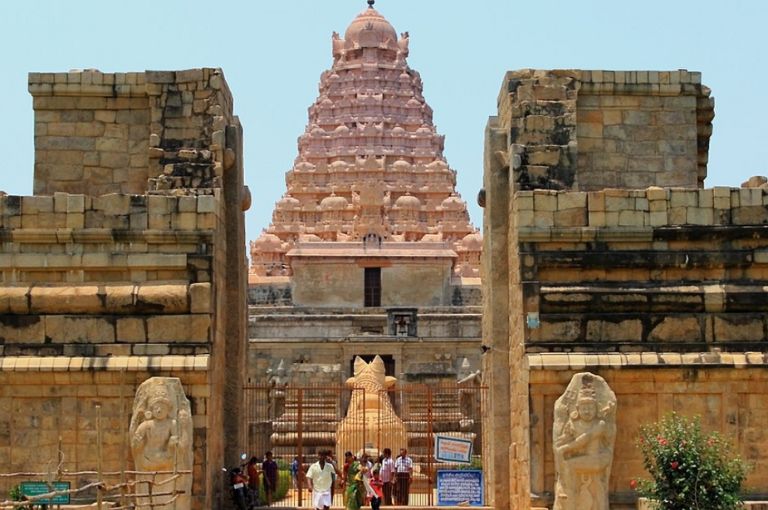
Located in Thiruvalanchuzhi near Thanjavur, the Vellai Puliar Temple is famous for its unique white idol of Lord Ganesha, believed to be made from sea foam (kadal norai). The temple’s serene environment, seven-tiered gopuram, and sacred legends make it a must-visit for devotees seeking blessings for new ventures.
Highlights:
Unique white Ganesha idol made of sea foam
Seven-tiered gopuram with detailed sculptures
Known for rituals that bless new beginnings
Calm, peaceful atmosphere away from crowds
Timings:
Morning: 6:00 AM – 12:00 PM
Evening: 4:00 PM – 8:00 PM
Darshan Time: 30–45 minutes
Entry Fee: Free
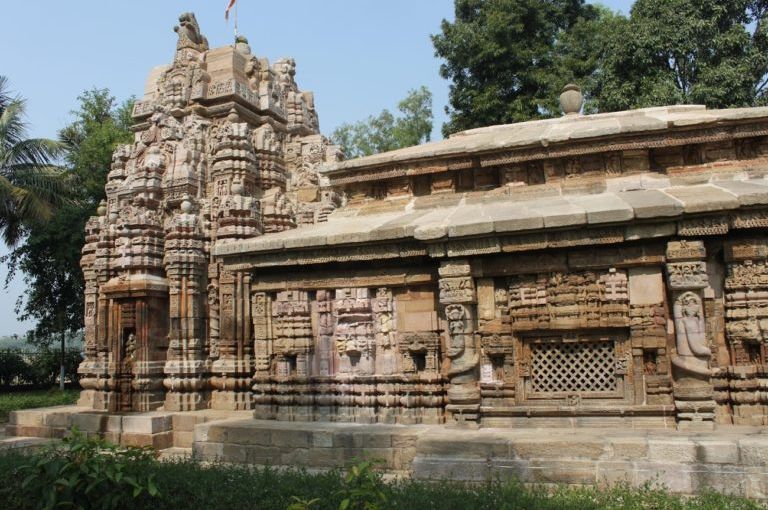
A smaller but spiritually powerful shrine dedicated to Goddess Varahi, this temple symbolises protection, wisdom, and strength. Its tranquil setting makes it perfect for meditation and reflection. It’s one of the lesser-known gems among Thanjavur temples, attracting devotees who prefer a more personal spiritual experience.
Highlights:
Dedicated to Goddess Varahi, the divine protector
Peaceful, meditative environment
Ideal for those seeking spiritual strength and inner peace
Located close to other major Thanjavur temples
Timings:
Morning: 6:00 AM – 11:00 AM
Evening: 5:00 PM – 8:00 PM
Darshan Time: Around 1 hour
Entry Fee: Free
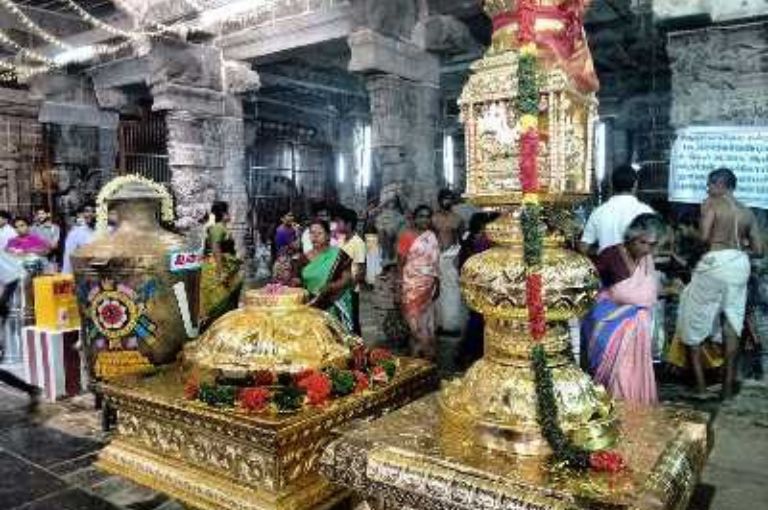
Located just behind the Chakrapani Temple in Kumbakonam, the Varahaperumal Temple honors Lord Vishnu’s Varaha avatar and his consort Bhudevi. It’s one of five Vishnu temples linked to the prestigious Mahamaham festival, held every 12 years. Pilgrims particularly visit for relief from land and property troubles, reflecting its legendary association with restoring the Earth.
Key highlights include its ancient architecture, Garuda Sevai, and grand festivals like Maasi Magam. It’s a peaceful, historically rich shrine that adds depth to the region's spiritual fabric.
Timings: 8:00 AM – 11:30 AM, 5:00 PM – 8:00 PM
Darshan Time: 1–2 hours
Entry Fee: Free
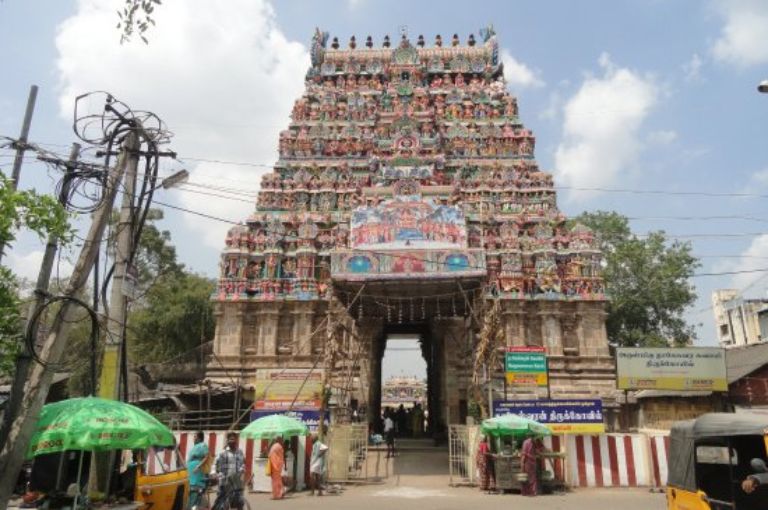
Among the oldest in the region, the Nageswaraswamy Temple is dedicated to Shiva in his serpent manifestation, Nagaraja. Mentioned in early devotional Tamil literature (Tevaram), it features grand gopurams and layered precincts—testaments to both Chola and Nayak period craftsmanship.
Timings: 5:30 AM – 10:00 PM (six daily rituals)
Darshan Time: 1–2 hours
Entry Fee: Free
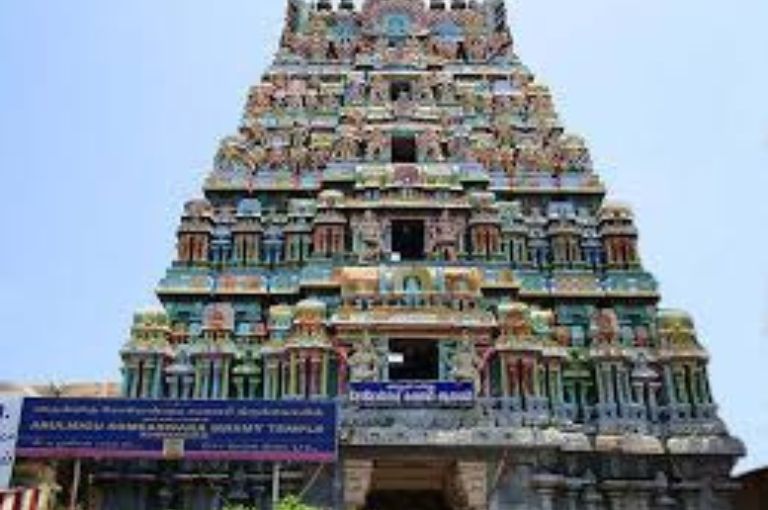
This Chola-origin shrine honors Lord Shiva as Someswarar and is classified among the sacred “Paadal Petra Sthalams,” celebrated in Tevaram hymns. Its multi-tiered Rajagopuram and ritual schedule—six daily poojas and vibrant festivals like Masi Magam—highlight its living tradition.
Timings: 6:00 AM – 9:00 PM (six daily rituals)
Darshan Time: 1–2 hours
Entry Fee: Free
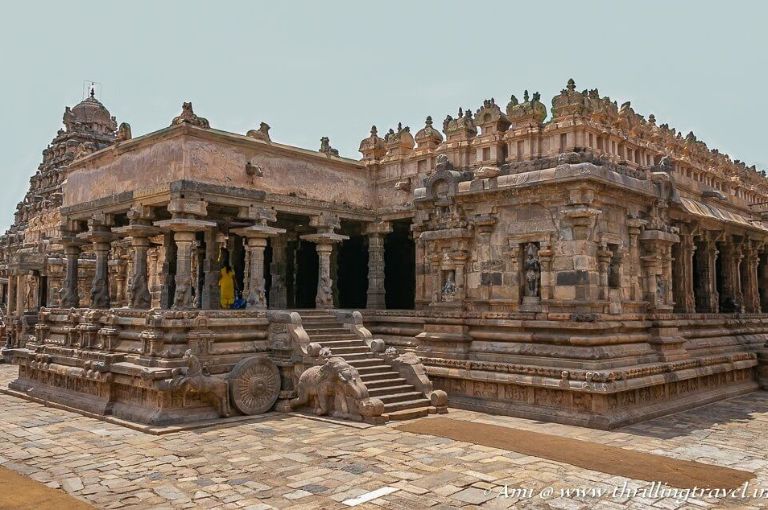
Part of the Great Living Chola Temples, the Airavatesvara Temple was built by Rajaraja II in the 12th century CE. Known for its chariot-shaped design and sun dials, it celebrates Shiva in a subtly ornate structure adorned with saints, gods, and cosmic motifs.
Timings: 8:00 AM – 12:00 PM, 4:00 PM – 8:00 PM
Darshan Time: 1–2 hours
Entry Fee: Free
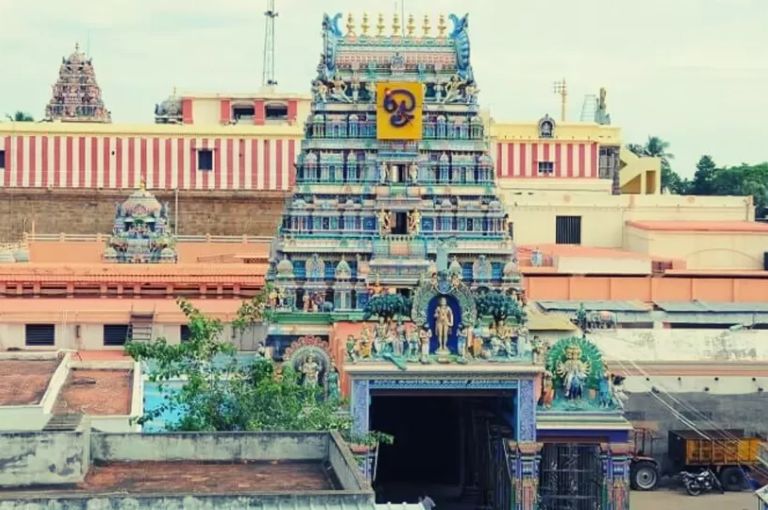
One of Lord Murugan’s six sacred abodes (Arupadaiveedugal), Swamimalai Temple is perched atop a modest hill with sixty steps—each symbolizing a Tamil year. The legend goes that Murugan taught the meaning of “Om” to Shiva here. A peaceful yet spiritually profound destination.
Timings: 6:00 AM – 12:00 PM, 4:00 PM – 9:00 PM
Darshan Time: Around 1 hour
Entry Fee: Free
Morning
6:00 AM – 8:00 AM → Brihadeeswarar Temple (Tanjore Big Temple / Periya Kovil)
Catch the sunrise over the Vimana. Best time for peaceful darshan and photography.
8:00 AM – 8:30 AM → Breakfast at a local South Indian eatery (idli, dosa, filter coffee).
Mid-Morning
8:45 AM – 9:30 AM → Thanjavur Palace & Art Gallery (optional but recommended for Tanjore paintings).
9:45 AM – 10:30 AM → Varahi Temple (short drive from Big Temple).
Late Morning
10:45 AM – 12:15 PM → Airavatesvara Temple, Darasuram (UNESCO site, intricate stone work).
Lunch Break
12:30 PM – 1:30 PM → Lunch at a vegetarian restaurant in Kumbakonam.
Afternoon
1:45 PM – 2:30 PM → Nageswaraswamy Temple.
2:45 PM – 3:30 PM → Someswarar Temple.
Evening
4:00 PM – 5:00 PM → Leisure tea/snack break at a local coffee house.
5:15 PM – 6:30 PM → Evening darshan at Swaminatha Swamy Temple, Swamimalai.
Stay overnight in Thanjavur or Kumbakonam.
Morning
6:00 AM – 7:30 AM → Varahaperumal Temple (peaceful early visit).
7:30 AM – 8:00 AM → Breakfast in Kumbakonam.
Mid-Morning
8:15 AM – 9:30 AM → Explore Navagraha Temples nearby (start with closest ones like Suriyanar, Kanjanur, Thingalur if time permits).
Late Morning
9:45 AM – 10:30 AM → Stroll through Kumbakonam’s temple streets and local market for brass idols and souvenirs.
Lunch Break
12:00 PM – 1:00 PM → Traditional Tamil lunch.
Afternoon
1:15 PM – 3:30 PM → Visit remaining Navagraha temples in Thanjavur district if interested, or relax at your hotel.
Evening
4:00 PM – 5:00 PM → Return to Brihadeeswarar Temple for sunset view if staying in Thanjavur.
Transport: Hire a cab for 2 days (Thanjavur ↔ Kumbakonam temples are 8–40 mins apart).
Dress Code: Modest clothing covering shoulders & knees; many temples don’t allow footwear inside.
Photography: Ask permission—photography inside sanctum is prohibited in most temples.
Best Season: November to February for pleasant weather.
Thanjavur’s temples are not mere relics—they are living tapestries of faith, artistry, and ritual. Whether exploring the colossal heights of the Brihadeeswarar Temple, the spiritual sanctity of Varahaperumal Temple, or the melodic chants in Nageswaraswamy Temple, each shrine invites a deeper connection with history and the divine. Marvel at the Chola paintings, taste the legacy, and let your pilgrimage become an unforgettable exploration of Tamil Nadu’s cultural soul.